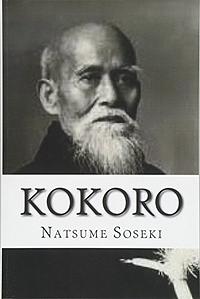Take a photo of a barcode or cover
emotional
reflective
sad
tense
slow-paced
Plot or Character Driven:
Character
Loveable characters:
Complicated
Diverse cast of characters:
No
Flaws of characters a main focus:
Yes
Me gusta la forma de pensar como el descubrimiento del sensei es algo que compartimos a la par con el personaje, aun en realidad el personaje quien escribe el libro ya sabía todo lo que iba a suceder. Esta manipulación de la línea de tiempo es muy útil en la integración del personaje y lector como uno.
SPOILER
Es una novela que está siempre marcada por la muerte o la enfermedad previa a esto, los padres, el emperador, el amigo. Todos personajes que dan un estatus de poder y de un ser que está más allá de la duda o el titubeo, en cambio el sensei descubrimos que es el mayor indeciso pero solo después de que este muerto, previamente se muestra también como un gran maestro de conocimiento. Probablemente se puede trazar la comparativa de esto como la idea de la muerte de los grandes relatos y un momento de transición donde se pone en duda el lugar de la tradición y el deber frente a un mundo de nuevas posibilidades. Solo quedan los hijos y las mujeres que frente a éstas perdidas deben reorganizarse y decidir si tomar el mandato o si es que pueden rechazarlo>
SPOILER
Es una novela que está siempre marcada por la muerte o la enfermedad previa a esto, los padres, el emperador, el amigo. Todos personajes que dan un estatus de poder y de un ser que está más allá de la duda o el titubeo, en cambio el sensei descubrimos que es el mayor indeciso pero solo después de que este muerto, previamente se muestra también como un gran maestro de conocimiento. Probablemente se puede trazar la comparativa de esto como la idea de la muerte de los grandes relatos y un momento de transición donde se pone en duda el lugar de la tradición y el deber frente a un mundo de nuevas posibilidades. Solo quedan los hijos y las mujeres que frente a éstas perdidas deben reorganizarse y decidir si tomar el mandato o si es que pueden rechazarlo>
dark
reflective
slow-paced
Plot or Character Driven:
Character
Strong character development:
Complicated
Loveable characters:
No
Diverse cast of characters:
No
Flaws of characters a main focus:
Yes
emotional
sad
slow-paced
Plot or Character Driven:
Character
Strong character development:
Yes
Loveable characters:
Complicated
Diverse cast of characters:
No
Flaws of characters a main focus:
Yes
dark
emotional
funny
reflective
sad
slow-paced
Plot or Character Driven:
Character
Strong character development:
Complicated
Loveable characters:
Yes
Diverse cast of characters:
Complicated
Flaws of characters a main focus:
Yes
This was a very interesting read and not one I would normally pick up. I really enjoyed how the Japanese culture was so integral, specifically the different outlooks. I also liked the pace of it and how much back ground was given. It really is a character focused book, and very well written. Even knowing what happens in the story, I was still shocked and not prepared for it when I got to the major plot point. It’s definitely a good read, and I can see why it’s so popular.
Graphic: Suicidal thoughts, Suicide
dark
emotional
reflective
sad
fast-paced
Plot or Character Driven:
Character
Loveable characters:
Complicated
dark
emotional
reflective
sad
medium-paced
Plot or Character Driven:
Character
Strong character development:
Complicated
Loveable characters:
Complicated
Diverse cast of characters:
No
Flaws of characters a main focus:
Yes
A tough, but lovely two-sided tale of how guilt about our own transgressions and the betrayals we're subject to inform our outlook on life. Plot somewhat similar to Eyeless in Gaza, though the narrative and the story are much simpler. Basic gist: if you don't trust or love yourself, who can you trust or love?
This is partially an emotion-driven coming-of-age story for the narrator, who grapples with his feelings of personal greatness and superiority over his uneducated parents, despite having no real conception of things like death. But a large part is also told from Sensei's point of view, indicating that a "coming-of-age" maturation and acceptance is not limited to a singular period within one's life.
Perhaps due to it being published in 1914, there are several misogynistic comments sprinkled through the pages and they pulled me out of the story, because they forced me out of the narrator's perspective. The narrator feels that an educated woman is not on par with an educated man. Ojosan, while kind and loving, does little besides flirt, giggle, and later, wait on her husband, willing to do anything to please him. While her mother Okusan is depicted as a "strong" woman, it is always beside a description of her as an army-wife, thus attributing her directness and strength of character to her husband and his occupation.
This novel felt very emblematic of classic Japanese literature, what with the struggle between the past and modernity, the gut-wrenching feelings of guilt and loneliness, and the contemplative ruminations on love, greed, and family.
Perhaps due to it being published in 1914, there are several misogynistic comments sprinkled through the pages and they pulled me out of the story, because they forced me out of the narrator's perspective. The narrator feels that an educated woman is not on par with an educated man. Ojosan, while kind and loving, does little besides flirt, giggle, and later, wait on her husband, willing to do anything to please him. While her mother Okusan is depicted as a "strong" woman, it is always beside a description of her as an army-wife, thus attributing her directness and strength of character to her husband and his occupation.
This novel felt very emblematic of classic Japanese literature, what with the struggle between the past and modernity, the gut-wrenching feelings of guilt and loneliness, and the contemplative ruminations on love, greed, and family.





